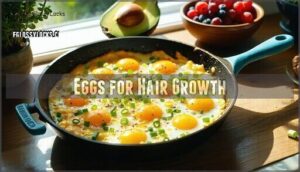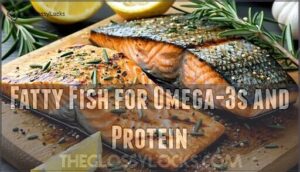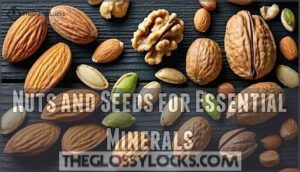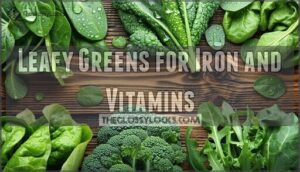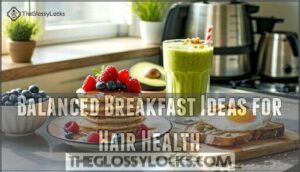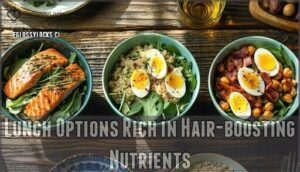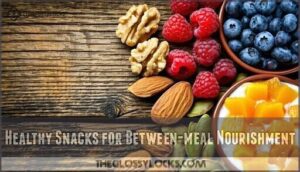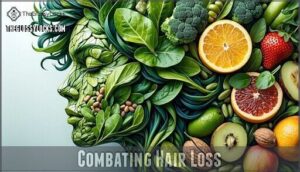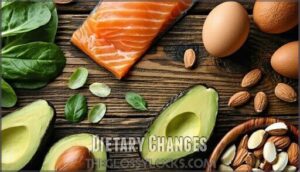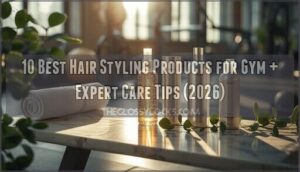This site is supported by our readers. We may earn a commission, at no cost to you, if you purchase through links.
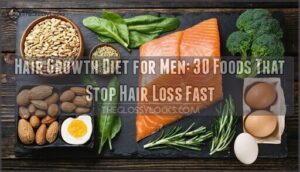 Your hair growth diet for men should focus on protein-rich foods like eggs and lean meats, which provide the building blocks for strong hair follicles.
Your hair growth diet for men should focus on protein-rich foods like eggs and lean meats, which provide the building blocks for strong hair follicles.
Include fatty fish such as salmon for omega-3s that reduce scalp inflammation, while nuts and seeds deliver zinc to block DHT—the hormone responsible for male pattern baldness.
Don’t overlook leafy greens packed with iron and biotin, or pumpkin seeds that naturally inhibit hair loss.
You’ll also want to stay hydrated and limit processed foods that spike inflammation, as the right combination of these nutrients can strengthen existing hair and stimulate new growth within months of consistent eating.
Table Of Contents
- Key Takeaways
- Essential Nutrients
- Power Foods
- Meal Planning
- Combating Hair Loss
- Hydration and Hair
- Dietary Changes
- Frequently Asked Questions (FAQs)
- Do supplements and vitamins work to thicken hair?
- Is it possible to speed up hair growth?
- Which vitamin deficiency causes hair loss?
- Does biotin work for hair growth?
- How do you use rosemary oil for hair growth?
- How do hormones impact hair growth for men?
- Can stress reduction improve hair health?
- Does smoking affect hair growth speed?
- How do exercise habits influence hair growth?
- What role do sleep patterns play in hair health?
- Conclusion
Key Takeaways
- Focus on protein-rich foods like eggs, salmon, and lean meats – they’ll provide the amino acids your hair follicles need to build strong keratin and prevent breakage
- Include DHT-blocking foods like pumpkin seeds, green tea, and nuts – these naturally reduce the hormone responsible for male pattern baldness while delivering essential zinc and biotin
- Load up on omega-3s from fatty fish and anti-inflammatory foods – they’ll reduce scalp inflammation that chokes hair follicles and improve blood circulation to deliver nutrients where you need them
- Stay consistent with hydration and limit processed foods – proper water intake supports nutrient delivery to your scalp while cutting sugar and processed foods prevents hormonal imbalances that accelerate hair loss
Essential Nutrients
Your hair needs specific nutrients to grow strong and healthy, just like your muscles need protein to build mass.
Understanding which vitamins and minerals fuel hair growth helps you make targeted dietary choices that can slow hair loss and improve hair quality.
Protein-rich Foods for Hair Strength
Your hair’s foundation depends on quality protein sources that deliver essential amino acids for keratin production.
Strong hair starts with the right amino acids fueling your follicles from within.
Without adequate protein for hair, your follicles can’t build the strong structure needed for healthy growth.
- Lean chicken breast delivering complete amino acids for follicle support
- Wild-caught salmon providing omega-3s alongside high-quality protein
- Grass-fed beef supplying iron and zinc with muscle-building amino acids
- Free-range eggs offering biotin and sulfur for hair strengthening foods
- Greek yogurt combining protein with probiotics for ideal nutrient absorption
Biotin and B-vitamins for Hair Health
B vitamins power your hair’s cellular machinery.
Biotin deficiency shows up as thinning hair, while a complete B-vitamin complex supports follicle strength.
Your hair growth diet needs biotin from eggs and almonds, plus B12 from meat.
Supplement dosage matters—excess won’t boost results faster.
Dietary sources beat pills for absorption factors affecting men’s hair health and hair loss nutrition.
Iron and Zinc to Prevent Hair Loss
Your body’s iron deficiency creates a direct pathway to hair loss through reduced ferritin levels and anemia link complications.
Zinc absorption plays an equally vital role in male pattern baldness prevention. Vitamin C also helps with iron absorption, preventing deficiency-related hair loss.
- Spinach and lentils – Combat iron deficiency with 6mg iron per cup
- Lean red meat – Provides heme iron for ideal ferritin levels restoration
- Pumpkin seeds – Deliver 2.9mg zinc for enhanced zinc absorption
- Chickpeas – Supply both iron for hair growth and zinc hair benefits
- Oysters – Contain 74mg zinc, supporting men’s hair health through improved hair loss nutrition
Omega-3 Fatty Acids for Scalp Health
Omega-3 fatty acids strengthen your scalp’s defense system by reducing inflammation that chokes hair follicles.
These powerful fats improve circulation to deliver nutrients while maintaining hydration balance for healthy sebum production. Fatty fish like salmon, plus walnuts and flaxseeds, prevent breakage through their anti-inflammatory properties.
Your scalp health diet needs these omega3 hair boosters for ideal follicle nutrition.
Power Foods
Your body needs specific nutrients to build stronger, thicker hair that won’t fall out prematurely.
These power foods contain the exact vitamins, minerals, and proteins your hair follicles require to stay healthy and productive.
Eggs for Hair Growth
Start with scrambled eggs for breakfast and you’ll be feeding your follicles exactly what they need.
Eggs contain complete protein that forms keratin, your hair’s building blocks.
The biotin benefits include strengthening strands from root to tip.
Egg nutrients like zinc support cellular repair while preventing breakage.
Despite cholesterol concerns, dietary cholesterol doesn’t impact blood levels substantially.
Try simple egg recipes like omelets with spinach for maximum hair growth potential.
Fatty Fish for Omega-3s and Protein
Salmon tops your men’s hair health arsenal with its dual-action power of omega3 fatty acids and protein-rich foods.
Choose wild-caught varieties over farmed to minimize mercury levels while maximizing nutrients. Grilling or baking preserves beneficial oils better than frying.
Mackerel and sardines offer sustainable sources with similar benefits. Fish oil supplements work if you can’t eat fatty fish twice weekly.
Simple recipe ideas include cedar-plank salmon with herbs or pan-seared mackerel with lemon – both support your hair growth diet naturally, with the added benefit of fatty fish.
Nuts and Seeds for Essential Minerals
When you’re looking to fortify your hair follicles, nuts and seeds pack a powerful punch of essential minerals.
Almonds deliver biotin and magnesium importance for stronger strands, while walnuts provide omega-3 sources that reduce scalp inflammation.
Pumpkin seeds and sunflower seeds offer zinc sources critical for hair growth and repair.
Brazil nuts contain selenium benefits that protect against oxidative damage.
Seed rotation promotes maximal mineral bioavailability—your body absorbs these nutrients more effectively when you vary your choices.
Enhanced zinc absorption occurs when you soak nuts overnight before eating them, which can lead to stronger strands and support hair growth.
Leafy Greens for Iron and Vitamins
Your hair growth diet gains serious power when you load up on leafy greens.
These iron-rich foods deliver vitamin sources your follicles need to stay strong. Spinach, kale, and Swiss chard pack folate benefits that boost red blood cell production, carrying oxygen to your scalp for ideal hair health.
It’s also important to note that autoimmune diseases can contribute to hair loss.
- Spinach – Contains iron absorption enhancers and vitamin C for maximum nutrient uptake
- Kale – Provides antioxidant power through vitamins A, C, and K for scalp protection
- Swiss chard – Delivers biotin and magnesium for stronger hair follicle development
- Arugula – Offers sulfur compounds that support keratin production in hair strands
- Collard greens – Supplies folate and iron for improved blood flow to hair roots
Meal Planning
Creating a strategic meal plan transforms scattered eating habits into a systematic approach for hair growth.
You’ll optimize nutrient timing and food combinations to maximize absorption of hair-strengthening vitamins and minerals throughout your day, which is crucial for hair growth.
Balanced Breakfast Ideas for Hair Health
Power foods alone won’t deliver results without proper timing.
Protein pancakes loaded with biotin rich foods kickstart your men’s hair health each morning. Try iron oatmeal topped with nuts for zinc scramble effects.
Omega toast with avocado provides healthy fats your follicles crave. These biotin smoothies and hair growth vitamins create the foundation for a healthy hair diet that promotes consistent hair growth throughout the day.
Many people find success with biotin based products, which can be a key part of a healthy hair diet.
Lunch Options Rich in Hair-boosting Nutrients
Midday meals fuel your body’s repair mechanisms while you’re conquering your workday.
Strategic Lunchtime Proteins paired with nutrient-dense ingredients create the perfect storm for follicle health.
Power-Packed Lunch Options:
- Salmon and avocado grain bowls with quinoa provide omega-3s and healthy fats
- Spinach salads topped with hard-boiled eggs deliver iron and protein
- Sweet potato and chickpea bowls offer beta-carotene and zinc
- Quick recipes combining these Salad Boosters maximize absorption
For convenient options, consider exploring a variety of pre-made omega-3 meals.
Dinner Recipes to Support Hair Growth
End your day with nutrient-rich recipes that fuel hair growth overnight.
Salmon Dinner provides omega-3s and protein for follicle repair. Try hearty Lentil Stew packed with iron and zinc.
Chicken Stir-fry delivers lean protein while quinoa bowls offer complete amino acids. An Egg Frittata combines biotin with vegetables for maximum nutrient absorption.
These dinner recipes create the perfect foundation for your hair growth diet. Many find that dinner supports growth is a key factor, with complete amino acids and biotin playing crucial roles.
Healthy Snacks for Between-meal Nourishment
Between meals, you’ll want snacking options that fuel hair growth without derailing your progress.
Smart Snack Timing involves eating every 3-4 hours to maintain steady nutrient delivery.
Focus on Nutrient Density with almonds, walnuts, and pumpkin seeds – these nuts pack zinc and biotin.
Greek yogurt with berries offers protein plus antioxidants.
Quick Recipes include trail mix combinations or seed-based energy balls.
Portion Control matters – stick to handful-sized servings.
Snack Variety prevents boredom while maximizing hair-supporting nutrients.
Combating Hair Loss
Your diet can directly influence DHT levels and inflammation that contribute to male pattern baldness. Strategic food choices help block hair-damaging hormones while nourishing follicles with growth-promoting nutrients.
Reducing DHT-promoting Foods
Cutting certain foods from your diet can substantially lower DHT production and slow male pattern baldness.
Limit refined carbs like white bread and pastries, which spike insulin and boost DHT synthesis. Reduce dairy consumption or switch to dairy alternatives, as regular milk intake raises testosterone levels.
Minimize processed meats and consider soy consumption for its DHT-blocking properties. Alcohol reduction also helps maintain hormonal balance and supports betasitosterol absorption from DHT blocking foods.
You can also incorporate natural DHT blockers into your diet to help maintain a healthy balance and reduce male pattern baldness, ultimately supporting hormonal balance.
Increasing Anti-inflammatory Foods
Chronic scalp inflammation blocks hair follicles and accelerates hair loss.
You can fight back with antiinflammatory foods that reduce oxidative stress and support gut health.
These foods help manage autoimmune conditions and food sensitivities that trigger scalp inflammation, creating the foundation for a hair growth diet plan.
- Fatty fish like salmon and mackerel deliver omega-3s that calm inflammation
- Berries packed with antioxidants neutralize free radicals damaging follicles
- Leafy greens provide vitamins that support immune function and reduce inflammation
- Turmeric contains curcumin, a powerful anti-inflammatory compound for scalp health
- Walnuts offer alpha-linolenic acid to decrease inflammatory markers naturally
Balancing Hormones Through Diet
Your hormone-hair connection starts with what’s on your plate.
Insulin resistance from high-sugar foods triggers DHT production, accelerating male pattern baldness.
Focus on cruciferous vegetables and fatty fish to support thyroid function while managing stress hormones.
Gut health directly impacts nutrient absorption for hormonal balance.
Choose DHT blocking foods like green tea over processed options to naturally reduce harmful hormonal changes affecting your scalp.
Increasing your intake of protein-rich foods can also help prevent hair breakage.
Supplementing With Saw Palmetto and Pumpkin Seeds
Boost your hair growth arsenal with saw palmetto and pumpkin seed oil supplements.
Clinical studies show saw palmetto (100-320mg daily) reduces DHT by 30%, while pumpkin seed oil (400mg daily) cuts scalp DHT by 40%.
These DHT blocking foods work half as effectively as finasteride but offer natural male pattern baldness support.
Consistency over several months maximizes hair growth vitamins benefits.
Hydration and Hair
Your hair follicles need proper hydration to produce strong, healthy strands from the inside out.
Water and nutrient-rich beverages create the foundation for ideal hair growth by delivering essential minerals directly to your scalp and follicles, which is crucial for healthy hair growth.
Water Intake for Hair Follicle Health
Your hair follicles need adequate hydration to function properly.
Dehydration effects include reduced nutrient delivery to hair follicles, compromising scalp health and hair growth.
Ideal intake ranges from 8-10 glasses daily, though water quality matters too.
Proper hydration benefits include improved scalp moisture and enhanced hair follicle nutrition, supporting stronger hair development, which relies on adequate hydration.
Herbal Teas Beneficial for Hair Growth
Several herbal teas effectively support hair growth through DHT blockers and scalp circulation enhancement.
Green tea’s EGCG compound inhibits DHT production while delivering powerful Tea Antioxidants. Nettle tea provides iron and silica for stronger follicles.
Hibiscus stimulates follicle activity, increasing thickness. Lavender reduces stress-related hair loss through improved circulation.
Hibiscus tea also helps in preventing hair dryness. For ideal Tea Preparation, steep these Specific Teas for 5-7 minutes daily.
Coconut Water for Electrolyte Balance
Natural coconut water serves as nature’s sports drink, delivering potassium, magnesium, and sodium that maintain proper cellular function.
This hydration source supports scalp circulation better than artificial beverages. As a post-workout drink, coconut water replenishes what you lose through sweat while promoting hair health through improved blood flow.
- Contains 600mg potassium per cup – more than most sports drinks
- Provides natural electrolyte benefits without artificial additives or excess sugar
- Supports scalp hydration through improved cellular water balance
- Acts as ideal natural beverage for daily hydration goals
- Enhances men’s hair health by maintaining perfect nutrient transport to follicles
Green Juice Recipes for Hair Nutrients
Beyond coconut water, green juice recipes pack concentrated nutrients directly to your hair follicles.
These blends maximize nutrient absorption while offering recipe variety for different tastes. Smart blending techniques preserve antioxidants from fruits and vegetables, creating smoothie recipes that rival traditional hair growth vitamins.
| Juice Ingredients | Hair Benefits |
|---|---|
| Spinach + Apple | Iron boosts follicle strength |
| Kale + Pineapple | Vitamin C aids collagen production |
| Cucumber + Celery | Hydrates scalp tissue |
| Carrot + Ginger | Beta-carotene supports sebum production |
| Beet + Lemon | Improves scalp circulation |
Mix sweeter fruits with leafy greens for taste improvement while maintaining the best foods hair nutrition profile.
Dietary Changes
Making simple dietary swaps can dramatically impact your hair’s health and growth potential.
You’ll need to cut back on sugar and processed foods while boosting your intake of vitamin D, calcium, and antioxidant-rich options to create the ideal environment for stronger, thicker hair, which can lead to healthier outcomes.
Limiting Sugar and Processed Food Intake
Sugar intake and processed foods create a perfect storm for hair loss.
These dietary habits trigger inflammation reduction problems while disrupting gut health and blood sugar stability.
When you consume high-sugar foods, your body experiences hormonal imbalances that affect nutrient absorption.
A proper hair growth diet eliminates these processed culprits, supporting your hair loss prevention goals through improved dietary habits.
Increasing Vitamin D and Calcium
Boosting vitamin D and calcium intake directly supports hair follicle health and prevents hair loss in men.
Research shows deficiency in these nutrients correlates with increased hair thinning and shorter growth phases.
- Sunlight Exposure: Get 15-20 minutes daily for natural vitamin D production
- Fortified Foods: Choose cereals and plant milks with added nutrients
- Dairy Alternatives: Try calcium-rich almond or soy milk options
- Supplement Choices: Consider D3 supplements if dietary intake is low
- Bone Health: Strong bones support overall nutrient absorption for hair growth
Eating Foods Rich in Antioxidants
Free radicals create oxidative stress that damages hair follicles and accelerates hair loss.
Antioxidants neutralize cellular damage, protecting your scalp from premature aging. You’ll find powerful compounds in colorful fruits and vegetables that strengthen hair growth naturally.
| Food | Key Antioxidants | Hair Benefits |
|---|---|---|
| Blueberries | Anthocyanins, Vitamin C | Improve circulation, collagen production |
| Guava | Vitamin C, Lycopene | Strengthen hair shaft, prevent breakage |
| Green Tea | EGCG, Catechins | Block DHT, reduce inflammation |
| Dark Chocolate | Flavonoids, Copper | Increase blood flow to scalp |
| Spinach | Beta-carotene, Lutein | Protect follicles from damage |
These nutrient-rich foods combat the root causes of hair loss by reducing inflammation and supporting healthy follicle function.
Eating foods rich in vitamin C stimulates collagen synthesis, which also benefits hair health.
Managing Stress Through Diet and Lifestyle
Chronic stress wreaks havoc on men’s hair health by disrupting your hair growth cycle and increasing cortisol levels.
Your stress levels directly control how fast your hair falls out.
Combat this with stress-reducing foods like dark chocolate, green tea, and fatty fish rich in omega-3s. Practice mindful eating during meals to lower stress hormones.
Regular exercise benefits include improved circulation to hair follicles. Prioritize sleep quality and use relaxation techniques like deep breathing to support healthy hair growth naturally.
Frequently Asked Questions (FAQs)
Do supplements and vitamins work to thicken hair?
Actions speak louder than words" – supplements and vitamins can help thicken hair when you’re deficient in key nutrients like biotin, iron, or zinc.
However, they won’t work miracles if genetics or hormonal factors are the primary cause of your thinning hair, which is often the case where genetics play a significant role.
Is it possible to speed up hair growth?
You can’t dramatically speed up hair growth since follicles have natural cycles, but you can optimize conditions.
Proper nutrition, scalp massage, and avoiding damage help maximize your hair’s natural growth potential.
Which vitamin deficiency causes hair loss?
Several vitamin deficiencies can trigger hair loss, but iron, biotin, and vitamin D deficiencies are the most common culprits.
You’ll also see thinning from low zinc, vitamin A, and protein levels affecting follicle health.
Does biotin work for hair growth?
Biotin’s effectiveness for hair growth isn’t straightforward—while it’s essential for healthy hair, you’ll only see benefits if you’re deficient. Most people get enough from their diet naturally.
How do you use rosemary oil for hair growth?
Mix 2-3 drops of rosemary oil with a carrier oil like coconut or jojoba.
Massage into your scalp, leave for 10 minutes, then shampoo out.
Use 2-3 times weekly for best results.
How do hormones impact hair growth for men?
Male hormones, particularly testosterone and DHT (dihydrotestosterone), directly control your hair growth cycle.
DHT shrinks hair follicles, causing male pattern baldness by shortening the growth phase and thinning strands over time.
Can stress reduction improve hair health?
Yes, you can substantially improve your hair health by reducing stress.
Chronic stress disrupts your hair’s growth cycle, pushing follicles into the resting phase and causing increased shedding through telogen effluvium.
Does smoking affect hair growth speed?
Smoking reduces blood flow to hair follicles, limiting oxygen and nutrients essential for healthy growth.
This poor circulation slows your hair’s growth cycle and weakens strands, making them more prone to breakage.
How do exercise habits influence hair growth?
Regular exercise boosts blood circulation to your scalp, delivering nutrients that fuel hair follicles.
However, excessive sweating and tight headgear can clog pores and damage hair strands if you don’t maintain proper post-workout hygiene habits, which is crucial for preventing damage to hair strands.
What role do sleep patterns play in hair health?
Quality sleep directly impacts your hair’s growth cycle.
Poor sleep disrupts hormone production, increases stress hormones like cortisol, and reduces growth hormone release.
You’ll need 7-9 hours nightly for ideal follicle function and healthy hair growth.
Conclusion
Like a well-tuned engine running on premium fuel, your hair growth diet for men requires the right nutritional components to perform at their best.
You’ve learned that protein-rich foods, omega-3 fatty acids, and DHT-blocking nutrients form the foundation of healthy hair growth.
By incorporating eggs, fatty fish, nuts, seeds, and leafy greens into your daily meals, you’re providing your follicles with essential building blocks.
Remember to stay hydrated, limit processed foods, and maintain consistency, as your hair growth diet for men isn’t just about stopping hair loss—it’s about creating the ideal environment for strong, vibrant hair growth and promoting overall healthy hair.
- https://www.menshealth.com/nutrition/g63447018/best-foods-for-hair-growth-1737058470/
- https://www.mdhair.co/article/hair-loss-in-men-best-supplements
- https://www.healthline.com/nutrition/foods-for-hair-growth
- https://tryshed.com/blog/top-10-foods-for-hair-growth-in-2025
- https://naturopathic.org/news/692256/A-Physician-Approved-Grocery-List-For-Hair-Loss--Regrowth.htm

